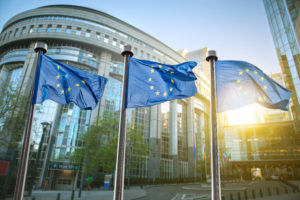Highlights from the Past Weeks
CW 29 / Monday, 17 to Thursday, 20 July: Committee Meetings Week (Brussels);
CW 30 / Monday, 24 to Thursday, 28 July: Green Week (no meetings);
CW 31-33 / Monday, 31 July to Sunday 20 August: Parliament Vacation;
CW 34 / Monday, 21 August to Friday, 25 August: Green Week (no meetings);
DSA I – 19 VLOPS/VLOSE SUBMITTED TO THE COMMISSION: Since Friday, a total of 19 very large online platforms and search engines (called VLOPS or VLOSE) visited by more than 45 million Europeans every month will have had to comply with the Digital Services Act (DSA).
Social media platforms in the crosshairs include Facebook, Instagram, TikTok, X/Twitter, YouTube, Snapchat, LinkedIn and Pinterest. Online marketplaces Amazon, Booking, AliExpress, Zalando, Google Shopping, as well as Wikipedia and Google Maps, will also face the new regulatory music. The new rules will also apply to Google and Apple’s app stores, and to Google Search and Microsoft’s Bing. (see Politico)
By the close of today, the VLOPs and VLOSEs involved should have submitted their reports to the Commission, listing the major systemic risks in each case and the plans for combatting them. Amazon and Zalando have challenged their classification as VLOPs in court.
DSA II – BRETON WANTS NO NATIONAL “SPECIALITIES”: In view of the intended full harmonisation of the Digital Services Act (DSA) and Digital Markets Act (DMA), “Member States should refrain from adopting national laws that would overlap with these regulations or create stricter or more detailed provisions in the concerned regulatory fields”, said Thierry Breton on 2 August in response (PDF) to a written question by MEP Geoffroy Didier (FR, EPP).
This MEP questioned the EU Executive on the French draft law on digital space, which is currently being examined by the French Parliament and was recently communicated to the Commission. The MEP expressed concerns that the text “has added provisions that go beyond those of the DSA and DMA”, fearing in particular that Paris could overstep its powers by allowing platforms to be blocked by independent administrative authorities. The Internal Market Commissioner assured that the Commission was “ready to use its enforcement powers, where necessary, to ensure that these regulations are adhered to”.
The Commission has created a new unit in the Directorate-General Connect (F1). This unit is to keep an eye on the increasing references to the DSA in numerous European legislative projects. It will also be responsible for interaction with the ECJ, and will check national framework conditions for their compliance with the DSA. (see Contexte, Paywall, FR)
TADPF – EDPB GUIDE FOR US DATA TRANSFERS: At its plenary meeting in July, the European Data Protection Board adopted an information note for individuals and entities transferring data to the US. This note aims to provide information regarding the impact of the adequacy decision on transatlantic data transfers and the redress mechanisms available under the Data Privacy Framework and in the area of national security. The EDPB agrees with the Commission’s assessment of the review and welcomes the proposal to move to a review cycle of four years. (see EDPB press release)
CHILD ABUSE – PARLIAMENT WILL RESUME ITS NEGOTIATIONS BEFORE SEPTEMBER: Rapporteurs in the Committee on Civil Liberties (LIBE) have scheduled three working days for the coming week: a political meeting on 30 August and two technical meetings on 29 and 31 August.
The Spanish Presidency recently proposed to extend the exemption from the ePrivacy Directive that allows platforms to search communications for such content, which is due to expire in August 2024. (see Contexte, paywall, FR).
Spain has circulated a new proposal (PDF) for the 5 September meeting.
ARTIFICIAL INTELLIGENCE I – FIRST TRILOGUE WITH MINIMAL PROGRESS: The first political trilogue on the AI Act of the Spanish Presidency took place in mid-July, but little progress was made on the issues that were not already virtually closed at the technical level. The only decision was to make regulatory sandboxes, but discussions heated up on presumption of conformity. On the Fundamental Rights Impact Assessment, the co-rapporteurs seem on track to scale down some of the requirements as they face opposition from both the Council and the Commission. For the parts on high-risk classification and use cases, the institutions merely restate their position. The next trilogue has been postponed from 26 September to 3 October ;due to conflicting agendas. (see Euractiv)
ARTIFICIAL INTELLIGENCE II – DOZENS OF INTERNATIONAL MEDIA CALL FOR REGULATION: The Agence France-Presse, the American group Gannett USA TODAY, and the American agency AP called in an open letter for “a legal framework” to protect “the content that powers AI applications”. In particular, they fear a loss of public trust in the media. “Even absent malicious intent, many generative AI applications […] produce factual errors and fictional information”, they warn. Their call joins that of RSF and some 15 partners who have been working since 27 July to create an AI Charter.
EIDAS – BACK TO THE NEGOTIATION TABLE: The final text of the Digital European Identity Regulation was purportedly finalised in June under the Swedish Presidency. But the Swedish-led negotiations were described by some stakeholders as being in tatters, and the rapid solution just days before the end of the Swedish Presidency seemed to come out of nowhere.
The current Spanish Presidency is holding a number of technical follow-up meetings, suggesting that eIDAS is not really a done deal yet. “The Swedes have left 50 per cent of the regulation untouched”, said one diplomat. “It cannot be ruled out that serious problems could still arise:” (see Politico Pro, paywall)
CYBERSECURITY – ASTV AND ITRE COMMITTEE READY FOR CYBER RESILIENCE ACT: The Industry Committee in the European Parliament (ITRE) adopted the report on the Cyber Resilience Act and the mandate for the trilogue negotiations before the summer break. The confirmation in the Parliament is to take place in September. The Permanent Representatives Committee in the Council has also finished its work and confirmed the general approach (PDF). This means that the trilogue negotiations can begin shortly. (see EP press release, Council press release)
DATA GOVERNANCE – LOGOS FOR RECOGNISED DATA PROVIDERS AND DATA ALTRUISM ORGANISATIONS: The Commission has introduced common logos to easily identify trusted data intermediation service providers and data altruism organisations in the EU. These providers and organisations aim to connect data holders with data users. The logo for data altruism organisations recognised in the EU must be accompanied by a QR code with a link to the EU public register of these organisations. This register will be available from 24 September. (see press release COMM).
DMA – COMMISSION LAUNCHES CONSULTATION ON USER PROFILES: The EU Executive has issued a draft consultation form for the Digital Markets Act (DMA) gatekeepers to submit to the European Data Protection Authorities six months after their designation. Under the Digital Markets Regulation, these gatekeepers – whose final list is expected by 6 September – will be required to conduct an independent review of the applied user profiling techniques and to publish an annually updated “overview” of these in order to remove entry barriers for potential competitors.
The Commission aims, in particular, to gather information about the list and purpose of the profiling methods employed, their compliance with the General Data Protection Regulation (GDPR) and the list and origin of the personal data used. It is also seeking various details regarding the public nature of profiling, its significance for the economic activities of companies, protective measures to prevent profiling of minors, or available alternatives to profiling. The consultation will run until 15 September.
ENERGY – COUNCIL ADOPTS ENERGY EFFICIENCY DIRECTIVE: The Agriculture and Fisheries Council adopted the recast of the Energy Efficiency Directive (EED) (PDF) on 25 July. The measure is expected to be published in the Official Journal of the EU in the coming weeks. The Directive will enter into force on the twentieth day following its publication in the EU Official Journal. (see Council press release).
KEY PERFORMANCE INDICATORS ON ONLINE PIRACY IN LIVE EVENTS: The Commission services have defined the key performance indicators (KPIs) established with the EUIPO Observatory.
The KPIs cover the volume of unauthorised retransmission of sports and other live events in Member States, the prompt treatment of notifices concerning these events, the cooperation between relevant market players, the use of dynamic injunctions, and the availability and awareness raising of the legal offer.
Based on the monitoring, the Commission will assess the effects of the Recommendation on the unauthorised retransmissions of live sports and other live events by 17 November 2025. (see press release COMM)
Relevant Publications, including from the EP Think Tank:
- The European Media Freedom Act: media freedom, freedom of expression and pluralism (Study)
- E-Evidence Regulation (EU) 2023/1543 (EU Official Journal L 191, 28 July 2023)
A Selection of the EU Commission’s Consultations
- European Union Agency for Cybersecurity and EU cybersecurity certification framework – evaluation – Feedback: 14 July to 16 September 2023
- Child protection – integrating systems – Feedback: 14 July to 20 October 2023
- Template relating to the reporting on consumer profiling techniques – Consultation: 31 July to 15 September 2023
Outlook for the Current Week
You can find a list of the upcoming dates of the European Parliament here. The meeting calendar for 2023 is available here (PDF), while the calendar for 2024 is accessible here.
An overview of the most important dates of the Council week can be found here and the meeting calendar can be accessed here.
The official calendar and the priorities of the new Spanish Presidency can be found on the associated website. A first draft of the calendars (PDF) of the Belgian Presidency 2024 has been published by Politico.
Included among the Council dates are:
Summits and Ministerial Meetings:
- Informal Meeting of Defence Ministers, Tuesday, 29 and Wednesday, 30 August – Programme;
- Informal Meeting of Foreign Affairs Ministers, Wednesday, 30 and Thursday, 31 August – Programme;
- Informal Meeting of Agriculture Ministers, Sunday, 3 to Tuesday, 5 September – Programme;
Preparatory Bodies:
- No meetings
Information about the weekly Commission meeting can be found on the website of the Commission in the preview (PDF) or (at short notice) in the current agenda. The next meeting will take place on 6 September.
The judicial calendar of the ECJ can be found here. During the summer break, no meetings are taking place between 16 July and 31 August.
European Parliament Committees
CW 35 / Monday, 28 to Thursday, 31 August: Committee Meetings Week (Brussels);
LIBE Committee (Civil Liberties)
Current Meetings
- None
Further Meetings (Calendar)
- Monday, 4 September, 14.30-18.00 (Brussels)
- Wednesday, 20 September 2023, 9.00-12.30 (Brussels)
JURI Committee (Legal Affairs)
Current Meetings
- None
Further Meetings (Calendar)
- Thursday, 7 September (Brussels)
Dossiers Timetable (24 July 2023)
ITRE Committee (Industry)
Current Meetings
- None
Further Meetings (Calendar)
- Thursday, 7 September (Brussels)
Dossiers Timetable (22 August 2023)
IMCO Committee (Internal Market)
Current Meetings:
- None
Further Meetings (Calendar)
- Monday, 18 September 2023 (Brussels)
- Tuesday, 19 September 2023 (Brussels)
Dossiers Timetable (July 2023)
CULT Committee (Culture)
Current Meetings
- None
Further Meetings (Calendar)
- Thursday, 7 September 2023 (Brussels)
Further Parliamentary Calendar Dates
- CW 36 / Monday, 4 to Thursday, 7 September: Political Group and Committee Meetings Week (Brussels);
- CW 37 / Monday, 11 to Thursday, 14 September: Plenary Sessions Week (Strasbourg);
- CW 38 / Monday, 18 to Thursday, 21 September: Committee Meetings Week (Brussels);




